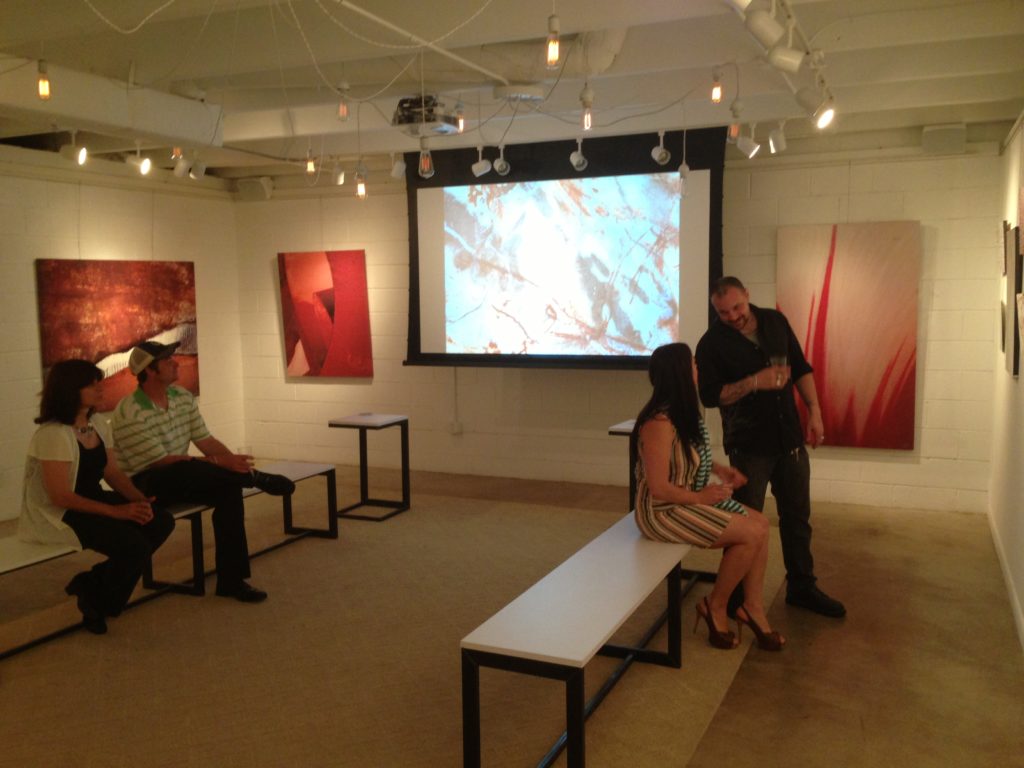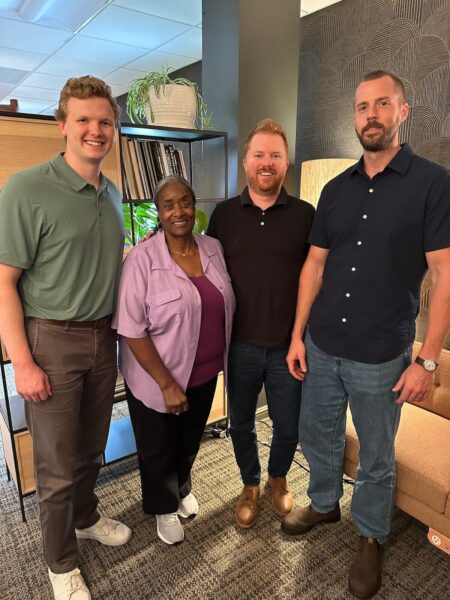Considering recent surges, event requirements in Nashville, and varying levels of comfort, socializing in 2021 has been a rollercoaster. For the time being, gathering at a small event space with people in the same boat tends to be the most palatable option. Then again, those who have avoided even small gatherings might feel uneasy about taking the leap, while those who have attended small events in 2021 may feel as though their social skills were rusty. Either way, we found tips to help get our social lives on the right path.
Tips on Socializing at Small Events
Talking with Strangers
Conversation is key to social events, especially at small events where it’s difficult to hide among the crowd. And the key to good conversation is being open to talking with someone new—or with whom you haven’t spoken in years. While the idea may seem scary at first, rest assured the humanizing exchanges will pay off.
Take it from Nic, a woman who shared how she broke out of her connection-less prison in an article from The Atlantic. Nic experienced childhood trauma that left her reluctant to speak with any stranger. However, during a trip abroad with friends, locals (strangers) would start conversations with her. These encounters opened her mind and helped her realize that impromptu conversations with strangers heals and enriches. She now seeks strangers to speak with, and coins these convos as “Greyhound Therapy.” Further, studies on speaking with strangers indicate that we feel more optimistic, more connected with our community, and less isolated when we brush away “stranger danger” and get to know other human beings on a whim.
In the same article, one psychologist, Gillian Sandstrom, recounts that a random conversation on the subway with a woman holding a box of fabulously decorated cupcakes somehow naturally led to discussing how humans can ride ostriches. The delightful exchange encouraged her to seek more opportunities to strike a conversation with people outside her circle.
Of course, being a psychologist, she endeavored to study the phenomenon. After speaking with total strangers, study participants reported an overall tone of relief. Sandstrom comments, “I think that relief might just be the feeling that we’re sold this message that the world is a scary place,” Sandstrom said, “and then you have a chat with someone, some random person, and it goes well, and it’s sorta like, Maybe the world isn’t so bad after all.”
While I can’t condone walking up to strangers in good conscience at this particular moment and time, there are perhaps small gatherings of friends and relatives you might be attending in the near future—seeing friends and relatives for the first time in so long that they might as well be strangers.
Or…perhaps you have a coworking or office neighbor you hardly know.
We venture to claim that the principle of “Greyhound Therapy” can apply to near-strangers. So let’s dive into ways to warm up those conversation muscles to help you connect or reconnect. Plus, these invaluable skills can transfer once speaking with strangers is safer again.

Active Listening: the 80/20 rule
For better conversations, something to practice is listening. One adventurous journalist, Joe Keohane, practiced “free listening” in a downtown LA district. He placed a cardboard sign next to him that said “Free Listening” and encouraged strangers to walk up and talk to him about anything and everything. The rules are, “don’t judge, don’t correct them. Don’t get into fights with them. Don’t offer advice. Don’t make it about you” Most importantly, Keohane states that the listener must follow “the 80/20 rule, where you make sure that the conversation is about them 80% of the time. And you talk about yourself just enough to establish some sort of commonality” This commonality, he claims, puts the talker at ease and helps them feel like they’re not being interrogated by the listener.
This practice is a great exercise to work those listening muscles for everyday conversation. If you have a tendency to verbally barrage people, try it out! Keohane assures that the resulting conversation will often surprise you, taking a hilarious, poignant, or challenging turn.
Conquer the Awkward Silence at Small Gatherings in 2021
Now that the listening portion is covered, how do you keep a conversation going and avoid the dreaded “awkward silence”? Jane Webber, assistant professor of counselor education at Kean University, suggests when you feel tension in your chest welling up, “Take a very quiet, deep breath in saying, ‘bring the calm in’ and a deep breath out saying [silently to yourself], ‘send my anxiety out.’”
Webber notes it’s best to avoid topics about the pandemic, and to pull topics from the “before times.” If you find it might be helpful, write down a few topics to discuss before arriving at the small event or venturing to talk with someone new. If you see people you haven’t spoken with in forever, try to remember things you enjoyed about them or memories you share. Bring those up as conversation starters.
And if the topic veers into territory you’d rather not discuss with them, you have every right to politely say “I’d rather talk about something else.” Of course, if this happens, be prepared with a different topic to bring up—like the time you went hiking and discovered that ferns grow in the wild.
For more go-to conversation starters for small events, here’s a list to get you started:
- What is the nicest thing someone has said to you?
- Where do you want to live out your golden years when you retire?
- What is one trait you are proud to have inherited from your parents?
- What’s better: the cool side of the pillow or warm laundry?
- Which celebrity voice would you give to Apple’s Siri or Amazon’s Alexa?
- Should toilet paper go over or under?
- Do you store ketchup in the refrigerator or pantry?
- Who are the best blue movie characters?
- What is the best breakfast food?
- What’s the best impulse purchase you’ve made?
Name It
And what if that back-up plan fails? Celeste Headlee, author of We Need to Talk: How to Have Conversations That Matter, advises being completely open and honest about your anxiety, since “sometimes when you name something, it takes away its power. Acknowledging the awkward with something as simple as, ‘So this is weird, right?’ can clear the air and get everyone moving forward.”
It may surprise you how many people relate to your feelings. Remember that we all have more in common than we think, especially when all of our lives have been affected by the pandemic in some form or fashion. While you may want to avoid the topic of the pandemic, you can use the common ground as an opportunity to exercise empathy.
People Do Like You
A key fact to boost your conversation confidence is that we all underestimate how much people enjoy talking with us. Researchers in Psychology at Cornell, Harvard, Essex, and Yale note the main obstacle to starting a conversation is that “it is hard for people to know what their conversation partners really think of them, leaving people uncertain about how much others like them, enjoy their company, and would like to interact again.”
Unless the person in front of us states outright how much they enjoy the conversation, we are left to assume that they think what we think of ourselves. Though, our assessment of our own self is often more critical than what others feel.
The aforementioned researchers call this social phenomenon “the liking gap.” Reasons for this gap are fear of social rejection paired with the cognitive strain of conversations, which often leads people to miss affirming cues from their conversation partner. This causes a “discrepancy in perspectives.” A vast majority of the time, the person you’re speaking with enjoys conversing with you. New conversations can be a rich source of happiness, especially if we let go of our self-conscious thinking.

Social Anxiety for Small Events in 2021
How could we forget the intensified social anxiety that resulted from mandated isolation and treating all social interactions as a potential exposure to COVID? People specifically tend to be more anxious about social gatherings in 2021, even if they’re at a small event venue with a small group of people.
If you have a new social anxiety you would like to work on to feel safe again around people you know and trust, like at a small family reunion or intimate gathering with old friends in a public event space, we found tips for that too.
First, there is the initial uncertainty of others’ level of comfort and caution. Are they ok with a hug? Am I ok with a hug? How many people are vaccinated and/or wearing masks? Etc. A good piece of advice is “when in doubt, ask.”
Thankfully in Nashville, the trend for large event venues is to require proof of full vaccination or a negative COVID test. With small event venues in Nashville, that can be more of a guessing game. For our 175 max capacity event venue Main Street Gallery, we leave it to the event coordinator’s discretion, though we highly encourage them to require proof of vaccination or a negative test.
Second, if you attend a small event and end up in a situation that is a little outside your comfort zone, remember you have every right to state your own level of comfort. Yes, you can turn down a hug.
And third, don’t expect yourself to jump in head first; integrating back into the world of social activity will happen in small steps. If the small gathering in an enclosed space seems too daunting, try smaller social activities like meeting one or two friends or family members for coffee. From there, you can try visiting some shops to get used to being around larger crowds. Small pedestrian-friendly boutiques could be a good start.
Along the way, be kind to yourself. Think back to all the stressful situations you’ve endured since lockdowns began. Finding “normal” situations comfortable again will take time. If you mess up or make a mistake as you branch out, view that situation as a learning experience. We are all trying to figure out how to navigate our lives, and we will all make mistakes along the way.

Take Control and Organize Your Own Small Event
Once you’re ready to attend a gathering in a small event space, there’s a chance you may not have one to attend yet. In that case, if you or someone you know loves to plan events, you can coordinate your own small gathering and invite close friends and family. Center 615 has the perfect small event spaces, with outdoor options, to host your next humble gathering in Nashville.
If you’re a member at Center 615, why not give these tips a try at our next campus Breakfast Social or Happy Hour?
In Summary: conversation tips at small events in 2021
To re-grease those rusty social skills for small events in 2021, try these tips:
- Be bold and consider striking up conversations with people you don’t know very well.
- Practice active listening during conversations and remember the 80/20 rule: listen 80% and contribute 20%.
- To prevent an awkward silence, prepare a handful of conversation starters (see list above).
- Be honest about how you feel if you become overwhelmed and anxious. There’s a chance others feel the same.
- Remember we often overly criticize our conversation skills. People like you more than you think they do.
- Stand up for yourself and let others know when a topic makes you uncomfortable. Have different topics on hand to keep the conversation moving (see list above).
- State your personal level of comfort.
- Ask beforehand about the event’s safety measures.
- Be kind to yourself. Slow progress is still progress.
- Have more control by organizing your own small event (indoors or outdoors).
Quotes may be lightly edited for clarity.




